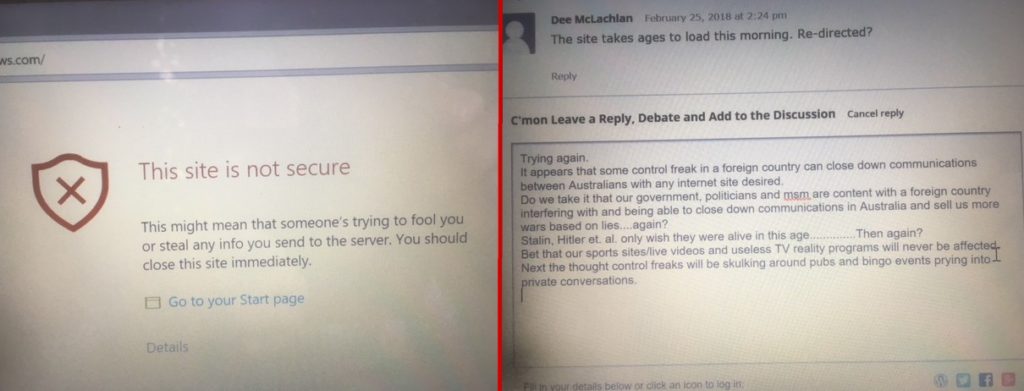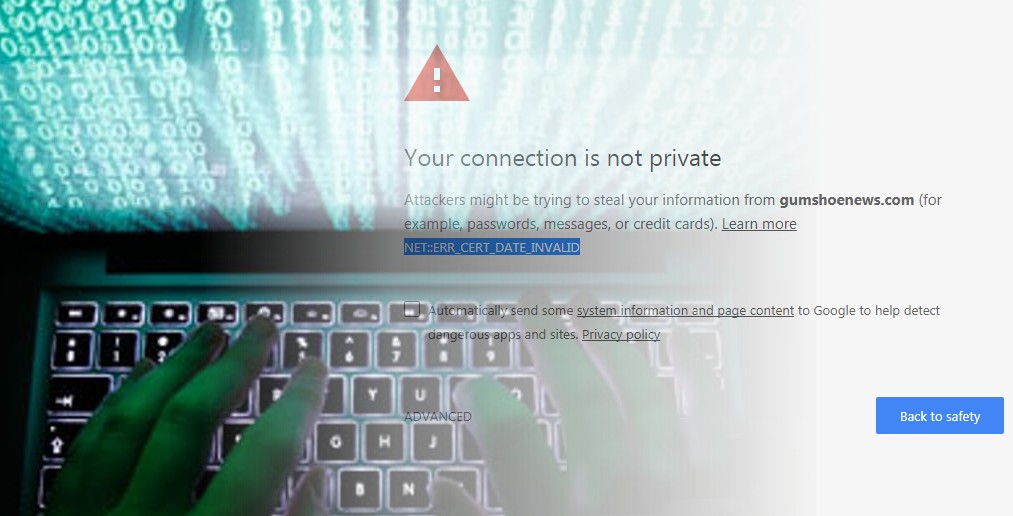This morning Gumshoe News had the above WARNING: “Your connection is not private.” It makes out that you are about to be “attacked.” The question is: by whom?
I received numerous emails, some of congratulations, saying that we are being noticed, and interfered with. This may or may not be the case, but I immediately called the hosting company in the US, and they reissued the SSL certificate. It had been “invalidized” somehow, causing this problem. It is a reminder that total control of the internet is only a click-of-switch away.
We don’t only have to worry about viruses and hackers. It is the anti-virus programs that we voluntarily download, for our safety, that spy on us — and steal our data and contacts.
Having lived in a police state before, Australians don’t seem to understand how the State’s behaviour is constantly training us all to obey. For the moment, the internet appears “free”, but we are surely in pre-totalitarian phase.
Have a good day.
Dee McLachlan
ALERT UPDATE:
Ned has sent me these screen-grabs below.
He has tried several times to enter a serious comment. These comments are BLOCKED or disallowed. But when he inserts an inane comment about “The quick brown fox jumped over the lazy dog!” is is accepted. He is furious.
































The site takes ages to load this morning. Re-directed?
They wouldn’t have put us in the net unless they could use it for snooping .
We are all tracked and the kids are micro chipped at birth . Have been for a few decades .
Herr Google is de facto communism .Did you notice the two “Teaze” yesterday ,at the White House , in red ties . The new boss is CCP global freemasonry .
A test after two failed tries.
Third try a wipe-out as well. What is a ‘invalid security token’?
wiped out again and I only commented on the problem.
There are very good Anti-Virus programs available, and IMHO everyone should have such a program installed on their system.
BUT, and there’s always a BUT isn’t there ? Having such a program installed does not mean your system is impervious to attacks or intrusions.
Let’s face it, Governments spend billions of dollars trying to achieve a secure network, and yet we constantly read or hear of alleged intrusions of their systems, so how in heck are we, the ordinary humble taxpayer ever going to secure our systems ????
IMHO, the best we can do, is instal good anti-virus protection, and store all secure information on secure DISCONNECTED devices from the Internet, and only open them when needed, I use two P.C.’s for this, one isolated and the work I do is copied on USB chip, transffered to my P.C. that is connected, and then downloaded to this P.C. The USB chip is then wiped clean and used again. Besides this would also conform to the COPY practice of files as well so they don’t get lost or destroyed even attacked.
Yeah, I know, awfully labor intensive, but if you wish to be totally secure, maybe installing a good encryption program is the way to go.
BUT, (again that BUT), anyone accessing any of your devices coming up against such encryption, (such as N.S.A. Officials) will immediately demand of you, what is it you are hiding. In such cases, I would always have a phone or P.C. that had nothing, other than the operating system contained upon it.
Eddy, you know that there are mechanisms for infecting the device firmware of a USB stick, right?
All of those sticks contain a separate microcontroller, basically a small dedicated computer, and it’s possible to infect that microcontroller with malware, which, in turn, will load the malware onto the PC when the PC tries to load the USB stick’s device drivers automatically.
On Windows, at least, there is little-to-no security checking at that level (loading the device drives from a memory stick) done.
Note that this microcontroller firmware memory is not the same as the contents of the USB sticks “disk space” that you see on your desktop.
It’s separate memory we can’t see, specifically for holding the firmware that the USB stick uses to function, and bad people can sometimes re-write it, either at the factory, or with physical access to the stick.
Some security researchers demonstrated this flaw by re-flashing the firmware on the stick’s microcontroller, and subsequently using that to run privileged code on the host computer without any security mechanism stopping them.
https://www.tripwire.com/state-of-security/security-data-protection/danger-usb/
It may sound like a wonky recommendation, but a good old-fashioned floppy-diskette, whose contents are scanned every time it’s inserted, won’t have such a problem, as there is no storage other than the floppy media itself to be exploited.
i had the notice using waterfox, its like firefox 🙂 – about gumshoe not having their SSL configured correctly..
and then using internet explorer.. just warnings about accepting paypal cookies, if i wanted to accept or deny.
site doesnt seems slow.. though on my useless NBN connection, nothing is fast.
I use Eset NOD antivirus, and Private Internet Access as my VPN
¯_(ツ)_/¯
FD, I was put onto ESET many years ago by a chinese computer geek. Works great. Not US based, (comes from Slovakia)
Never use North American (CIA) anti virus. Wise words from the prematurely-late Christopher Story.
I crawled under their door and had a comment posted on the preceding article…
Second try.
I have sent a screen shot to our webcontroller (not the other cf’s) of content apparentlly barred.
I will get back if necessary if I am a perceived danger to the cf’s.
I have sent a screen shot of my apparently barred comments to our webmistress. (And to a few others…… suck that up control freaks!)
I consent to the two screen shots being logged by ‘Ned’.
Control freaks: 0 Ned 1+
😁
last two down.
The quick brown fox jumped over the lazy dog!
and cherries on top
Idiot controllers
Their robot must be Called Seri..
These are the times that try men’s souls.
(Just checking the if the line from Adelaide is clear…)
For the record, that took 4 seconds to upload.
Lucky Mary; that you did not comment on foreign interference in conversations in Australia with Australians.
The quick brown fox refers readers to the addendum by Dee under the subject article. (;-}
Oz army ad on sevens closing winter ceremony showing and encouraging
young eighteen years plus girls to join their murderous mercenary force
by going on line and “search army” .
What on earth is going on ? more importantly , why ?
WHY NOT YOU LIKE ME?
Missed that Seri, ha ha.
OK Seri you have an interesting file of key strokes that elarm,
Barnaby?
twinkle tinkle little star?
what was wrong with bedtime?
So, is there an antivirus in existence that is not suspect, or perhaps, less suspect?
Seems to me it should be possible that one exists.
Kasperky? Avast? AVG?
Must they all be on the same side as “them”?
Yes, Joe, that is an axiom of totalitarianism. There cannot be any traders who are not “them.”
had lots of problem with western based security systems went to kaspersky and have not had a problem since and by the way kaspersky is the only one that actually have a office in Australia. and they have been able to beat a lot of the Nsa/cia hack programs
Articles on the Florida shooting here: http://veaterecosan.blogspot.co.uk/ Why can’t the MSM media make these observations and ask these questions? And why does government never provide satisfactory answers?